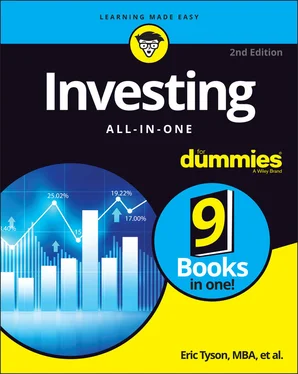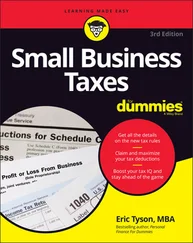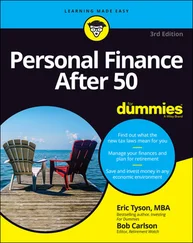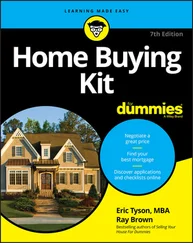Eric Tyson - Investing All-in-One For Dummies
Здесь есть возможность читать онлайн «Eric Tyson - Investing All-in-One For Dummies» — ознакомительный отрывок электронной книги совершенно бесплатно, а после прочтения отрывка купить полную версию. В некоторых случаях можно слушать аудио, скачать через торрент в формате fb2 и присутствует краткое содержание. Жанр: unrecognised, на английском языке. Описание произведения, (предисловие) а так же отзывы посетителей доступны на портале библиотеки ЛибКат.
- Название:Investing All-in-One For Dummies
- Автор:
- Жанр:
- Год:неизвестен
- ISBN:нет данных
- Рейтинг книги:3 / 5. Голосов: 1
-
Избранное:Добавить в избранное
- Отзывы:
-
Ваша оценка:
- 60
- 1
- 2
- 3
- 4
- 5
Investing All-in-One For Dummies: краткое содержание, описание и аннотация
Предлагаем к чтению аннотацию, описание, краткое содержание или предисловие (зависит от того, что написал сам автор книги «Investing All-in-One For Dummies»). Если вы не нашли необходимую информацию о книге — напишите в комментариях, мы постараемся отыскать её.
Investing All-in-One For Dummies
.
Dummies
Investing All-in-One For Dummies
Investing All-in-One For Dummies
Investing All-in-One For Dummies — читать онлайн ознакомительный отрывок
Ниже представлен текст книги, разбитый по страницам. Система сохранения места последней прочитанной страницы, позволяет с удобством читать онлайн бесплатно книгу «Investing All-in-One For Dummies», без необходимости каждый раз заново искать на чём Вы остановились. Поставьте закладку, и сможете в любой момент перейти на страницу, на которой закончили чтение.
Интервал:
Закладка:
If you think that the U.S. stock market crash that occurred in the fall of 1987 was a big one, take a look at Table 2-1, which lists major declines over the past 100-plus years that were all as bad as or worse than the 1987 crash.
Real estate exhibits similar unruly, annoying tendencies. Although real estate (like stocks) has been a terrific long-term investment, various real estate markets get clobbered from time to time.
TABLE 2-1Largest U.S. Stock Market Declines *
| Period | Size of Fall |
|---|---|
| 1929–1932 | 89% (ouch!) |
| 2007–2009 | 55% |
| 1937–1942 | 52% |
| 1906–1907 | 49% |
| 1890–1896 | 47% |
| 1919–1921 | 47% |
| 1901–1903 | 46% |
| 1973–1974 | 45% |
| 1916–1917 | 40% |
| 2000–2002 | 39% |
| 2020 | 36% |
* As measured by changes in the Dow Jones Industrial Average
U.S. housing prices took a 25 percent tumble from the late 1920s to the mid-1930s. When the oil industry collapsed in the southern United States in the early 1980s, real estate prices took a beating in that area. Later in the 1980s and early 1990s, the northeastern United States became mired in a severe recession, and real estate prices fell by 20-plus percent in many areas. After peaking near 1990, many of the West Coast housing markets, especially those in California, experienced falling prices — dropping 20 percent or more in most areas by the mid-1990s. The Japanese real estate market crash also began around the time of the California market fall. Property prices in Japan collapsed more than 60 percent.
Declining U.S. housing prices in the mid- to late 2000s garnered unprecedented attention. Some folks and pundits acted like it was the worst housing market ever. Foreclosures increased in part because of buyers who financed their home purchases with risky mortgages. Keep in mind that housing market conditions vary by area. For example, some portions of the Pacific Northwest and South actually appreciated during the mid- to late 2000s, while other markets experienced substantial declines.
After reading this section, you may want to keep all your money in the bank — after all, you know you won’t lose your money, and you won’t have to be a nonstop worrier. Since the FDIC came into existence in 1933, no one has lost 20, 40, 60, or 80 percent of their bank-held savings vehicle within a few years (major losses prior to then did happen, though). But just letting your money sit around would be a mistake.
 If you pass up the stock and real estate markets simply because of the potential market-value risk, you miss out on a historic, time-tested method of building substantial wealth. Instead of seeing declines and market corrections as horrible things, view them as potential opportunities or “sales.” Try not to give in to the human emotions that often scare people away from buying something that others seem to be shunning.
If you pass up the stock and real estate markets simply because of the potential market-value risk, you miss out on a historic, time-tested method of building substantial wealth. Instead of seeing declines and market corrections as horrible things, view them as potential opportunities or “sales.” Try not to give in to the human emotions that often scare people away from buying something that others seem to be shunning.
Later in this chapter, you find out about the generous returns that stocks and real estate as well as other investments have historically provided. The following sections suggest some simple things you can do to lower your investing risk and help prevent your portfolio from suffering a huge fall.
Diversify for a smoother ride
If you worry about the health of the U.S. economy, the government, and the dollar, you can reduce your investment risk by investing overseas. Most large U.S. companies do business overseas, so when you invest in larger U.S. company stocks, you get some international investment exposure. You can also invest in international company stocks, ideally via mutual funds and exchange-traded funds (see Chapter 1in Book 5).
Of course, investing overseas can’t totally protect you in the event of a global economic catastrophe. If you worry about the risk of such a calamity, you should probably also worry about a huge meteor crashing into Earth. Maybe there’s a way to colonize outer space… .
 Diversifying your investments can involve more than just your stock portfolio. You can also hold some real estate investments to diversify your investment portfolio. Many real estate markets actually appreciated in the early 2000s while the U.S. stock market was in the doghouse. Conversely, when U.S. real estate entered a multi-year slump in the mid-2000s, stocks performed well during that period. In the late 2000s, stock prices fell sharply while real estate prices in most areas declined, but then stocks came roaring back.
Diversifying your investments can involve more than just your stock portfolio. You can also hold some real estate investments to diversify your investment portfolio. Many real estate markets actually appreciated in the early 2000s while the U.S. stock market was in the doghouse. Conversely, when U.S. real estate entered a multi-year slump in the mid-2000s, stocks performed well during that period. In the late 2000s, stock prices fell sharply while real estate prices in most areas declined, but then stocks came roaring back.
Consider your time horizon
Investors who worry that the stock market may take a dive and take their money down with it need to consider the length of time that they plan to invest. In a one-year period in the stock and bond markets, a wide range of outcomes can occur (as shown in Figure 2-1). History shows that you lose money about once in every three years that you invest in the stock and bond markets. However, stock market investors have made money (sometimes substantial amounts) approximately two-thirds of the time over a one-year period. (Bond investors made money about two-thirds of the time, too, although they made a good deal less on average.)
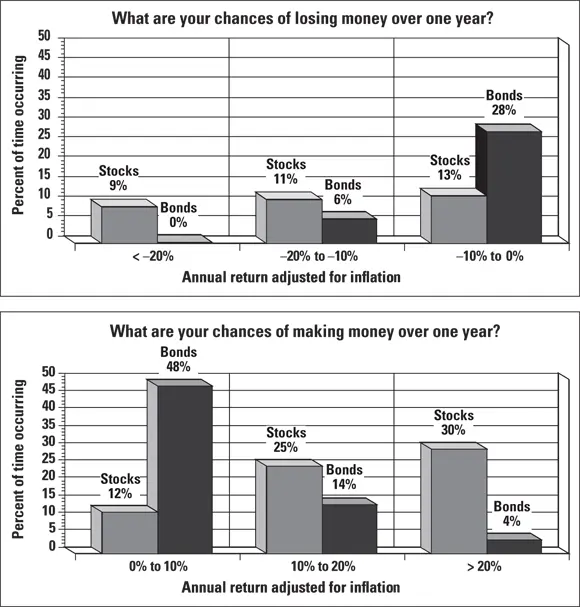
© John Wiley & Sons, Inc.
FIGURE 2-1:What are the odds of making or losing money in the U.S. markets? In a single year, you win far more often (and bigger) with stocks than with bonds.
Although the stock market is more volatile than the bond market in the short term, stock market investors have earned far better long-term returns than bond investors have. (See the later section “ Stock returns” for details.) Why? Because stock investors bear risks that bond investors don’t bear, and they can reasonably expect to be compensated for those risks. Remember, however, that bonds generally outperform a boring old bank account.
 History has shown that the risk of a stock or bond market fall becomes less of a concern the longer that you plan to invest. Figure 2-2 shows that as the holding period for owning stocks increases from 1 year to 3 years to 5 years to 10 years and then to 20 years, there’s a greater likelihood of seeing stocks increase in value. In fact, over any 20-year time span, the U.S. stock market, as measured by the S&P 500 index of larger company stocks, has never lost money, even after you subtract the effects of inflation.
History has shown that the risk of a stock or bond market fall becomes less of a concern the longer that you plan to invest. Figure 2-2 shows that as the holding period for owning stocks increases from 1 year to 3 years to 5 years to 10 years and then to 20 years, there’s a greater likelihood of seeing stocks increase in value. In fact, over any 20-year time span, the U.S. stock market, as measured by the S&P 500 index of larger company stocks, has never lost money, even after you subtract the effects of inflation.
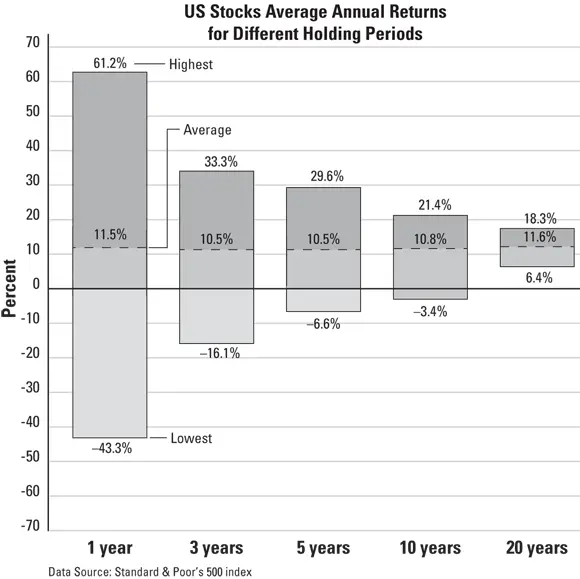
© John Wiley & Sons, Inc.
FIGURE 2-2:The longer you hold stocks, the more likely you are to make money.
Most stock market investors are concerned about the risk of losing money. Figure 2-2 clearly shows that the key to minimizing the probability that you’ll lose money in stocks is to hold them for the longer term. Don’t invest in stocks unless you plan to hold them for at least five years — and preferably a decade or longer. Check out Book 3for more on using stocks as a long-term investment.
Читать дальшеИнтервал:
Закладка:
Похожие книги на «Investing All-in-One For Dummies»
Представляем Вашему вниманию похожие книги на «Investing All-in-One For Dummies» списком для выбора. Мы отобрали схожую по названию и смыслу литературу в надежде предоставить читателям больше вариантов отыскать новые, интересные, ещё непрочитанные произведения.
Обсуждение, отзывы о книге «Investing All-in-One For Dummies» и просто собственные мнения читателей. Оставьте ваши комментарии, напишите, что Вы думаете о произведении, его смысле или главных героях. Укажите что конкретно понравилось, а что нет, и почему Вы так считаете.
